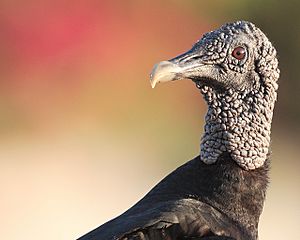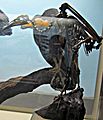New World vulture facts for kids
Quick facts for kids New World vultures |
|
|---|---|
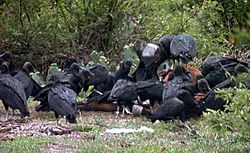 |
|
| American Black Vultures on a cow carcass | |
| Scientific classification | |
| Kingdom: | |
| Phylum: | |
| Class: | |
| Order: | |
| Family: |
Cathartidae
Lafresnaye, 1839
|
| Genera | |
|
Coragyps |
|
New World vultures are a group of vultures found only in the Americas. They belong to the family called Cathartidae. There are seven different species of these birds, grouped into five genera. Four of these groups have only one species each.
These are large birds of prey that eat the meat of dead or dying animals. The name "Cathartidae" comes from a Greek word meaning "to clean." This is because they help clean up nature.
Unlike many other birds of prey, New World vultures have a very good sense of smell. Their nostrils have a unique hole that goes all the way through their beak. Also, while some other vultures hop, New World vultures walk on the ground.
The two biggest species in this group are known as condors.
Contents
Amazing Features of New World Vultures
New World vultures are generally large birds. The smallest, like the lesser yellow-headed vulture, are about 56–61 centimeters (22–24 inches) long. The largest, the California and Andean condors, can reach 120 centimeters (48 inches) in length. They can also weigh 12 kilograms (26 pounds) or more!
Most of these vultures have black or brown feathers. Some also have white markings. All species have heads and necks without feathers. This helps them stay clean when they eat. In some vultures, this skin is brightly colored. The king vulture even has colorful skin growths called wattles.
All New World vultures have long, wide wings and a stiff tail. These features are perfect for soaring high in the sky. They are among the best soaring birds on land. Their feet have claws, but they are weak. They are not made for grabbing prey like eagles do. Their front toes are long and have small webs between them.
New World vultures do not have a syrinx. This is the special voice box that most birds use to sing. So, these vultures can only make simple grunts and hisses.
Their beak is slightly hooked and not very strong. It is designed to tear the soft meat of animals that have already died. Their nostrils are oval-shaped and set in a soft area called a cere. You can actually see right through their beak from one side to the other! Their eyes stick out, and unlike eagles, they don't have a bony brow above them. Some vultures have a single row of eyelashes on their upper lid and two rows on their lower lid. Others have no eyelashes at all.
New World vultures have a strange habit called urohidrosis. This means they poop on their legs to cool themselves down. It's like a natural air conditioner! Storks do this too, which suggests these two bird groups might be related.
Where New World Vultures Live
New World vultures live only in the western part of the world. You can find them from southern Canada all the way down to South America. Most species stay in one place all year. However, turkey vultures that live in Canada and the northern US will migrate south for the winter.
These vultures live in many different places. They can be found in deserts, tropical rainforests, and even high up in mountains. They use their amazing sense of smell to find dead animals to eat. Sometimes, you might even see them near towns, looking for food like roadkill.
Life and Habits of New World Vultures
Reproduction and Life Cycle
New World vultures and condors do not build fancy nests. Instead, they lay their eggs on bare surfaces. They usually lay one to three eggs, depending on the species.
When the chicks hatch, they are naked, without feathers. Later, they grow soft down. Like most birds, the parents feed their young by regurgitation. This means they bring up food from their stomach for the chicks to eat. The young birds need a lot of care and usually leave the nest after 2 to 3 months.
How They Find Food
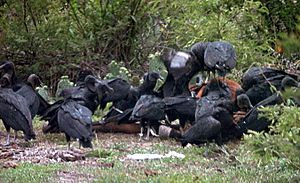
All living New World vultures and condors are scavengers. This means they mostly eat carrion, which is the meat of dead animals. You will often see them gathered around animal carcasses. They also sometimes eat fruit (especially rotten fruit) and garbage.
A special thing about the Cathartes vultures is their super strong sense of smell. They use it to find dead animals. They can smell a gas called ethyl mercaptan, which comes from decaying bodies. The part of their brain that handles smells is very large. Other vultures, like the American black vulture and the king vulture, don't have a good sense of smell. They find food by sight, sometimes by following Cathartes vultures or other scavengers.
Types of New World Vultures
There are seven species of New World vultures, grouped into five genera. The main groups are Coragyps, Cathartes, Gymnogyps, Vultur, and Sarcoramphus.
| Living Species | |||
|---|---|---|---|
| Common and Scientific Names | Image | Description | Where They Live |
| Black vulture Coragyps atratus |
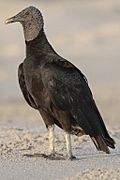 |
South America and north to the US | |
| Turkey vulture Cathartes aura |
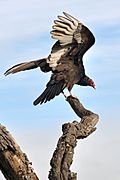 |
All over the Americas, up to southern Canada | |
| Lesser yellow-headed vulture Cathartes burrovianus |
 |
South America and north to Mexico | |
| Greater yellow-headed vulture Cathartes melambrotus |
 |
Amazon Basin in tropical South America | |
| California condor Gymnogyps californianus |
 |
California, and used to live in many mountains of western North America. | |
| Andean condor Vultur gryphus |
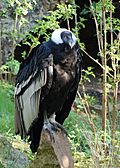 |
Andes mountains | |
| King vulture Sarcoramphus papa |
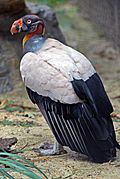 |
Southern Mexico to northern Argentina | |
Images for kids
-
Andean condor skeleton (Museum of Osteology)
See also
 In Spanish: Buitres americanos para niños
In Spanish: Buitres americanos para niños
 | Percy Lavon Julian |
 | Katherine Johnson |
 | George Washington Carver |
 | Annie Easley |


